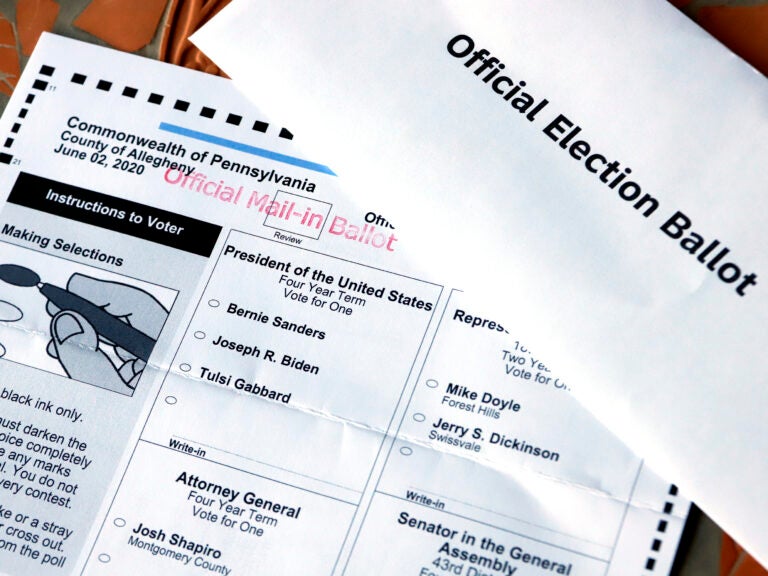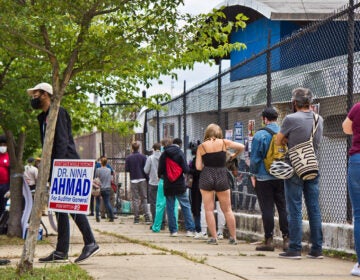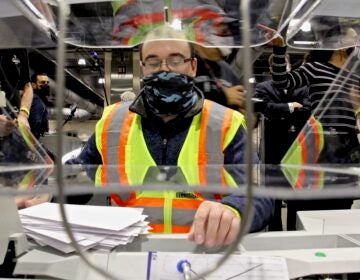‘Naked ballot’ rejections could mean lost mail votes in Pa.
A last-minute rule change means Pa. voters could have their ballots tossed if they forget an envelope. Dems are launching an ad hoc education campaign.

This May 26 photo shows an official Democratic primary mail-in ballot and secrecy envelope for the Pennsylvania primary in Pittsburgh. (Gene J. Puskar/AP Photo)
After a state Supreme Court ruling, Pennsylvania voters have been talking a lot about “naked ballots.” The court said voters who return ballots without the secrecy envelopes that hide their selections should not be counted.
Mira Rabin came very close to sending a naked ballot when she mailed in her choices for Pennsylvania’s June primary.
“I read the instructions, or thought I did,” she said. “I filled it out, put it in the envelope, sealed it, and then said, `Wait, what’s that other envelope?’”
It was the secrecy envelope.
She ended up carefully reopening her mailing envelope, adding the second envelope, and trying to reseal the whole thing. It wouldn’t stick, so she taped it shut.
“I was worried that it looked like a ballot that had been tampered with, so I signed my name over where the tape was in two places, and I mailed it,” she said.
Around the same time, Lynn Tatala, who lives outside Pittsburgh, actually did mail her primary ballot without its secrecy envelope. Like Rabin, she realized her mistake after she’d sealed the outer envelope. But unlike Rabin, she decided to leave it.
“I don’t know why I was so nonchalant at that point,” she said. “I said to my husband, I said, `Hey, I think I have an extra envelope. Do you think that matters?’ And then I just like, put it aside and we mailed them in, and I never thought about it again.”
In June, Rabin’s and Tatala’s different decisions really didn’t matter.
Before the state Supreme Court’s ruling, counties had been free to make their own decisions about naked ballots. The counties where the two women live, Philadelphia and Allegheny, were both tabulating them as a matter of course, and Rabin and Tatala both said they got emails telling them their ballots had been accepted.
But now, there is a blanket rule. And if those same voters, at opposite ends of the state, made those same decisions with general election ballots, Rabin’s would probably count and Tatala’s wouldn’t.
The strict new rule is adding some uncertainty to how the election will pan out in Pennsylvania, perhaps the most important swing state in the country.
Paul Gronke, an Oregon political science professor who directs the Early Voting Information Center, said the earlier approach, in which counties made their own decisions about secrecy envelopes, was standard among the 16 states that use them.
“I’ve been working closely on election administration-related issues with vote by mail nearing 20 years now,” he said. “I have never heard about ballots being rejected simply because they don’t use the secrecy envelopes.”
It’s hard to know how widespread naked ballots are in Pennsylvania.
Populous Delaware County, next to Philadelphia, reported that it tallied a couple hundred naked ballots in the primary. Nearby Berks County reported just a few. Most others who responded to inquiries said they didn’t keep track.
Philadelphia officials tracked the issue in the 2019 general election, and said more than 6% of the absentee ballots they received were missing secrecy envelopes. That election came before a significant expansion in the state’s mail voting laws, so election officials received only a fraction of the mailed ballots it will in this year’s election.
But Philadelphia City Commissioner Lisa Deeley used the percentage to extrapolate the impact that blanket naked ballot rejections might have statewide. She came up with an attention–grabbing number: 100,000 ballots could be invalidated.
The data isn’t good enough to draw definite conclusions about whether Deeley is right. But Gronke said one thing is certain: Voters who are “more detached from the political system” are more likely to be disenfranchised by technical violations.
“It’s going to be voters of color, lower-income voters, mobile voters, younger voters — these are the folks who are going to be hurt by these changes,” he said.
These are groups that are often likelier to vote for Democrats. And in this election, Democratic voters are considered significantly more likely to cast ballots by mail than Republicans are.
Brendan Welch, a spokesman for the Pennsylvania Democratic Party, said as soon as staff understood the implications of the ruling on secrecy envelopes, they buckled down.
“This has really been an all-hands-on-deck effort from us and the Biden team and the [Democratic National Committee] all kind of working hand in hand to make sure that we spread the word and educate voters,” he said.
They’re pumping out short videos and infographics on social media and reaching out to voters. Celebrities have also been spreading the word.
Welch said he feels optimistic that the number of people who ultimately forget their secrecy envelopes will be small.
But even small numbers could matter. Four years ago, Donald Trump won Pennsylvania by less than one percentage point.
The actual margin? Just 44,000 votes from among 6 million.
WITF reporter Emily Previti contributed to this reporting.

Your go-to election coverage
WHYY is your source for fact-based, in-depth journalism and information. As a nonprofit organization, we rely on financial support from readers like you. Please give today.







